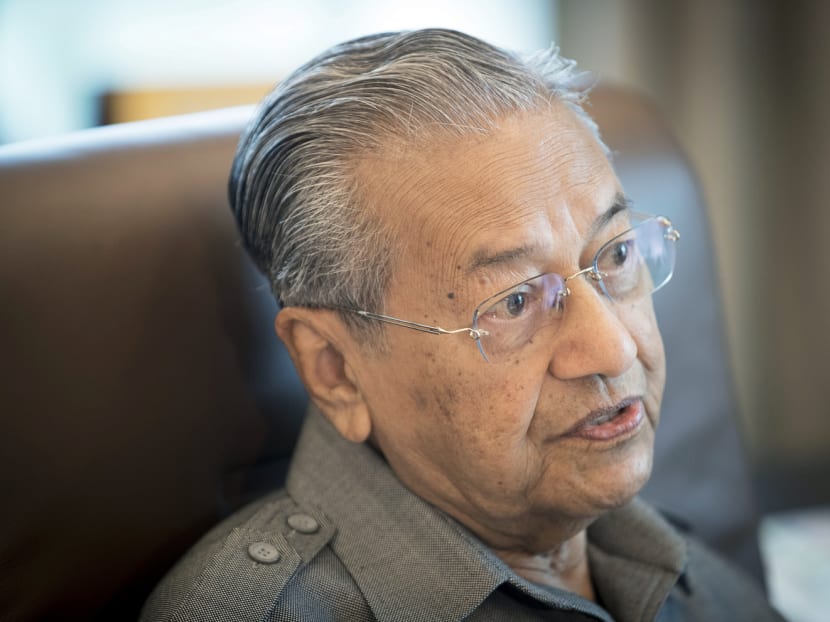We can restore Malaysia’s reputation: Opposition
KUALA LUMPUR — Former Malaysian strongman Mahathir Mohamad says the opposition alliance can win the next general elections and pull Malaysia back from a slide into kleptocracy.

Former prime minister Mahathir Mohamad believes his party can garner the support of voters left frustrated by scandals and rising living costs. Photo: AP
KUALA LUMPUR — Former Malaysian strongman Mahathir Mohamad says the opposition alliance can win the next general elections and pull Malaysia back from a slide into kleptocracy.
The energetic 92-year-old, Asia’s longest-serving leader before stepping down in 2003, has made a high-profile return to politics in a bid to oust his protege, Prime Minister Najib Razak.
Dr Mahathir told The Associated Press in an interview that the disparate opposition coalition he has spearheaded to contest elections due by the middle of next year is tapping into anger at the corruption scandal and the rising cost of living.
“Lots of people feel that Najib has destroyed much that has been built for this country,’’ he said. “People are calling our leader a crook. That is not something I would like to see perpetuated. It must change back to the days when we were doing well.”
The United States and several other countries are investigating allegations of cross-border embezzlement and money laundering at 1MDB, a state investment fund set up and previously led by Mr Najib to promote economic development but which accumulated billions in debt.
The US Justice Department says at least US$4.5 billion (S$6.05 billion)was stolen from 1MDB by associates of Mr Najib, and it is working to seize US$1.7 billion taken from the fund to buy assets in the US — potentially its largest asset seizure ever.
Mr Najib has denied any wrongdoing and has been cleared by the Malaysian authorities.
In the interview, Dr Mahathir said he does not want to be prime minister again and that his aim is simply to topple Mr Najib and restore Malaysia’s reputation.
Despite speculation that Mr Najib may call elections this year, Dr Mahathir said he believes polls will be held next year because Mr Najib wants time to strengthen his support in eastern Sabah and Sarawak states on the island of Borneo.
The two states, both strongholds of rural Malay support for the governing Barisan Nasional coalition, jointly contribute about a quarter of parliamentary seats and helped Mr Najib win the 2013 polls despite losing the national popular vote to the opposition for the first time.
“We will win support on the ground,’’ Dr Mahathir said. “We hope to win with a simple majority.’’ Yet gerrymandering will make it tough to win more seats than the ruling coalition. The Election Commission last year redrew electoral boundaries that critics said created more Malay-majority seats to ensure victory for Mr Najib, though opposition parties are contesting the move in court.
A doctor by training, Dr Mahathir is credited with transforming Muslim-majority Malaysia from an economic backwater into a modern trading nation that has leapt past most of its South-east Asian neighbours in living standards. But his rule was also clouded by authoritarianism and maverick outbursts on the international stage.
“Whatever may be the differences in the past, the problem that we face with Najib is far greater. If we don’t get rid of him, we will achieve nothing,” he said.
Dr Mahathir said there is a deep reservoir of anger among urban voters, and while the rural poor might not feel affected by the graft scandal, they are upset by a higher cost of living that partly stems from an unpopular goods and services tax.
Mr Najib’s meeting last week with President Donald Trump was aimed at seeking political legitimacy, Dr Mahathir said, but it backfired after he pledged billions of dollars of investment for the United States economy while there are economic problems at home. “This country has the capacity to become a fully developed country if the right policy and plans are carried out,’’ he said. But under Mr Najib, we “run the risk of becoming a bankrupt country, a failed country.’’ AP






